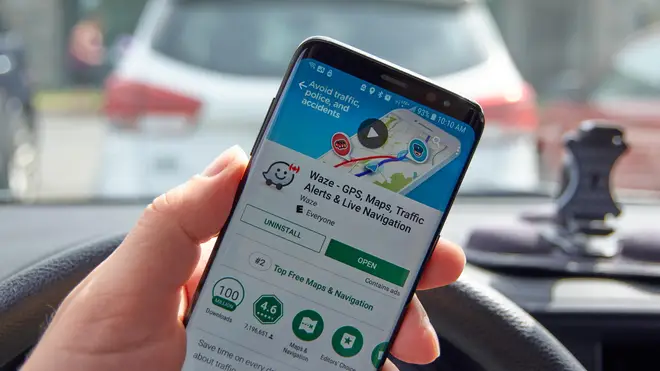
Ali Miraj 12pm - 3pm
30 August 2022, 18:34

Surrey Police’s traffic officers admitted reporting their locations on Waze even when they are moving.
A police force has been accused of misleading drivers after traffic officers admitted reporting their locations on a sat nav app even when they are moving.
Surrey Police claimed the tactic “works perfectly” by encouraging drivers to slow down.
The Waze app enables users to report driving conditions such as traffic jams, accidents and police sightings.
We definitely don’t drop Police markers on Waze at random points on our patrol, nope – never 😉
An easy way to get drivers to slow down on our roads – thanks @waze . pic.twitter.com/rrv9I9LJJ6
— Roads Policing – Surrey Police – UK (@SurreyRoadCops) August 29, 2022
This helps other motorists take alternative routes or avoid being caught speeding.
Police locations are generally reported for stationary officers, such as those operating speed traps, but Surrey’s roads policing teams posted on Twitter that they use the function while driving.
The tweet read: “We definitely don’t drop police markers on Waze at random points on our patrol, nope – never.”
It featured a winking emoji to indicate that the opposite is true, before adding: “An easy way to get drivers to slow down on our roads – thanks @waze.”
Works for around 10-20 mins. Every little helps.
— Roads Policing – Surrey Police – UK (@SurreyRoadCops) August 29, 2022
This led to many angry comments, accusing the force of “creating phantom units”, “putting false information” on the app, “lying” and altering computer records “to deceive other users”.
The police Twitter account stated that its location alerts are “technically not false” as officers “are there at that very specific point in time”.
It added: “Nowhere on Waze does it say the patrol has to be stationary.”
Ru Roberts, UK Country Manager at Waze, said: “The police reporting feature is meant to notify drivers of general police presence and promote road safety, because users tend to drive more carefully and obey traffic laws when they are aware of nearby police.
“Alerts on Waze are verified by drivers – for example, you may be asked to confirm if a traffic jam or construction is “Still there?”. This applies to police alerts, meaning that if users do not verify the presence of police on the road, the alert will be removed from the Waze map.”
Regarding the removal of markers, the force wrote that it has tested its tactic and it “works for around 10-20 minutes”, adding: “Every little helps.”
In response to someone claiming they “never see” traffic officers despite driving “thousands of motorway miles over the last few months”, the police Twitter account wrote: “We’re not responsible for the significant cuts to policing budgets over the years that decimated traffic units across the country.”
AA president Edmund King said the “real issue” with Surrey Police’s use of Waze is “the huge reduction in cops in cars”.
Home Office figures show the number of full-time equivalent roads policing officers in England and Wales has fallen by 22% in the past seven years, from 5,237 in March 2015 to 4,102 in March 2022.
Mr King added: “We know that speed camera signs and interactive smiley face signs do affect driver behaviour and slow some drivers down.
“The use of police markers on Waze to indicate a police presence is just the modern day equivalent of a speed camera sign.
“With five deaths per day on our roads, it is difficult to argue with police tactics that potentially slow drivers down and save lives.
“Law-abiding motorists have nothing to worry about.
“Ultimately we would like to see more cops in cars to reduce broader crime but in the interim the police must do what they can to make roads safer.”